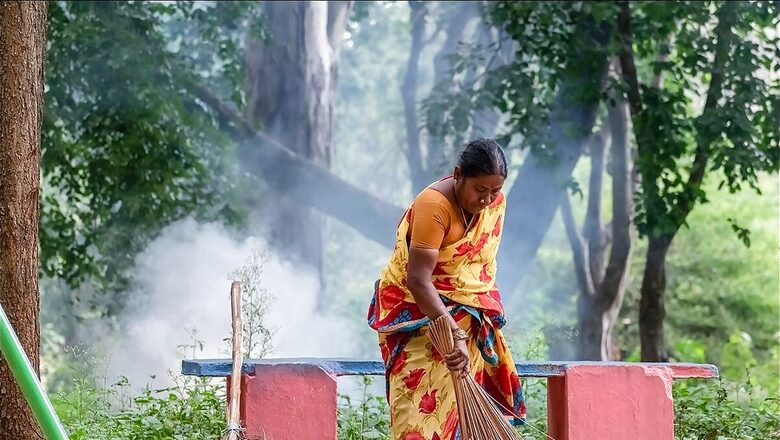
views
Irrespective of whether we live in villages, small towns or large metropolises, there are certain needs that remain the same, even though the challenges that they pose differ. The absolute basics include access to food, education, transport, and of course, sanitation.
Sanitation is a vital service that affects the health, dignity and well-being of all populations. However, it is also a sector that is often neglected, stigmatised and underfunded. Women sanitation workers, in particular, face multiple challenges and barriers in their work, such as discrimination, harassment, low wages, lack of safety and social protection.
The situation of women sanitation workers varies depending on whether they work in urban or rural settings.
Urban Women Sanitation Workers
Urban India, with its bustling cities and rapidly growing population, presents a dynamic but often chaotic environment for women sanitation workers. While their work is indispensable in maintaining cleanliness, the urban jungle brings forth a set of distinct challenges.
In urban areas, the density of population is often much higher than in rural regions. This translates to an overwhelming workload for sanitation workers. With countless households, public facilities, and commercial spaces to clean, these women often find themselves stretched to their limits.
Sanitation work is also a form of caste-based discrimination, as it is mostly performed by people from the lowest and most marginalised castes in India. Women sanitation workers face double discrimination based on their caste and gender, as they are often subjected to abuse, violence and social exclusion by the dominant castes and their own communities.
Urban environments also pose higher health risks. The cramped quarters and the sheer volume of waste can expose sanitation workers to a greater risk of infections and diseases. This heightened risk affects not only their physical well-being but also their mental health, as they grapple with the fear of falling ill.
Moreover, women sanitation workers have little or no access to basic amenities, such as toilets, water, electricity and health care. They also lack legal recognition, social security and labour rights. They are often paid meagre wages, sometimes in kind rather than cash, and have no bargaining power or voice in decision-making.
Rural Women Sanitation Workers
While urban environments present their unique set of challenges, rural India offers a different canvas. Here, amidst the vast expanses of fields and tight-knit communities, women sanitation workers grapple with a distinct set of difficulties.
Rural women sanitation workers also face several challenges and constraints in their work. For instance, they have to deal with patriarchal norms and attitudes that restrict their mobility, autonomy and participation. They often face resistance and opposition from men and elders who are reluctant to change their habits or invest in toilets. They also have to cope with the lack of infrastructure, resources and support from the government and other stakeholders.
Rural communities often struggle with economic disparities, and women sanitation workers are no exception. Their earnings may be meagre, making it challenging to support their families and secure their futures.
There is also a lack of awareness regarding hygiene and sanitation practices in some rural areas. Women sanitation workers find themselves not only cleaning but also advocating for better hygiene in their communities.
Additionally, rural women sanitation workers have limited opportunities for skill development, career advancement and income generation. They are often dependent on external funding and incentives for their work, which may not be sustainable or sufficient. They also have low awareness and access to their rights and entitlements as workers.
How Harpic World Toilet College is Making a Difference
As India’s leading brand in the lavatory care segment, Harpic has a very nuanced understanding of the challenges that sanitation workers face. To remedy at least some of these challenges, Harpic established the Harpic World Toilet College (HWTC) in 2016 with the stated objective of improving the quality of life of sanitation workers through their rehabilitation by linking them with dignified livelihood options. Workers trained by the college are provided placement with various organisations. Following the successful proof of concept in Rishikesh, HWTCs have opened in Maharashtra, Aurangabad, in partnership with Harpic, Jagran Pehel and Maharashtra Government.
HWTC’s curriculum addresses these issues and challenges head on. It equips these women with technical skills to manage the complexities of waste management – from operating machinery to understanding sanitation protocols. The program places a strong emphasis on health and safety, ensuring that these women have all the knowledge and resources to protect themselves from the increased health risks in urban settings. HWTC also lays special emphasis on soft skills. It instils confidence and communication abilities, allowing these women to better handle societal perceptions and assert themselves in their roles.
In this way, HWTC fosters a sense of empowerment, enabling these women to challenge traditional gender norms. As they become skilled and confident, they inspire others in their communities to rethink societal expectations. In so doing, these women often act as change agents, spreading awareness about the importance of sanitation and hygiene. This advocacy is invaluable.
Of course, the HWTC is only one part of the solution. For 3 years now, Harpic has partnered with News18 to create Mission Swachhta aur Paani, a movement that champions the cause of inclusive sanitation, equality for all genders, abilities, castes and classes and the strong belief that clean toilets are a shared responsibility.
Between the nuance that Harpic brings to the discussion and the reach that News18 provides, Mission Swachhta aur Paani has made great strides in raising awareness of the challenges faced by this community, and the possible solutions. It also engages stakeholders across the spectrum – elected officials, municipal officers, NGOs, activists, the sanitation workers themselves and the common man, in discussions that help foster understanding, and more importantly, empathy.
In reading this article, you too, are part of the solution. Join us here, to add your voice to this growing movement.




















Comments
0 comment